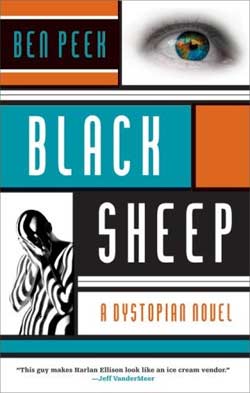Review: Black Sheep by Ben Peek
Tuesday, July 31, 2007
Black Sheep by Ben Peek
Prime Books
pdf; 333 pages
ISBN 0809562634
At 333 pages, the .pdf of Black Sheep is an easy read on a computer. Prime Books have chosen a comfortable default font and my only quibble with the layout would be that, at times, there's a lot of blank space to page through.
Set in a dystopian future, Black Sheep chronicles the downfall of narrator Isao Dazai, who is "convicted of being Japanese" in Asian-Sydney. Multiculturialism is now considered a disease for which the only cure is ruthless segregation. We're in Orwellian territory here, with routine surveillance of citizens by cameras, microphones, and powerful masked Segregators, and a history and culture that's tailored to your ethnic origin, which in turn dictates where you can live.
The story starts with Isao undergoing a show trial, at which he's not permitted to speak, but soon flashes back to show the reader how he got there. For me, this lengthy flashback was the least effective section. All we really learn about Isao is that he's a maybe rebel without a cause: disaffected without knowing why, and ineffectual without being endearing. It's hard to believe that so much effort and manpower needs to be put in to entrapping him--and even harder to believe that, after he's been explicitly warned these tactics are being used, he doesn't for one moment suspect what's coming. Despite the first-person narrative, we never get below the surface of Isao's character, and he's continually driven by events rather than being pro-active. He drifts through this phase of the novel as he drifts through life, and it's hard to resist skipping ahead to find out what happens to him after his trial.
The novel's pace picks up after Isao is Assimilated, becoming a puppet of the state with no will of his own, and controlled by guilt for his 'crime'--the implanted murder of his wife. Although presented with far greater obstacles than in his previous existence, he succeeds in throwing off his conditioning and sets out to uncover the bleak truth about Peek's vision of future Australia. The novel ends poignantly, and not entirely without hope.
Peek's writing is tolerable but not stellar, and is plagued by repeated homophone errors--"too" for "to" being perhaps the most egregious. The future world is well imagined, if implausible--who watches all the footage? listens to all the tapes?--and there's excellent irony here and there, but the plot relies on at least one far-fetched coincidence and the characterisations are not strong. Isao's character in particular can't carry the narrative.
If you're a fan of dystopias, you'll probably want to add this to your collection; otherwise, it's a suitable read for a train journey or rainy night.
Prime Books
pdf; 333 pages
ISBN 0809562634
At 333 pages, the .pdf of Black Sheep is an easy read on a computer. Prime Books have chosen a comfortable default font and my only quibble with the layout would be that, at times, there's a lot of blank space to page through.
Set in a dystopian future, Black Sheep chronicles the downfall of narrator Isao Dazai, who is "convicted of being Japanese" in Asian-Sydney. Multiculturialism is now considered a disease for which the only cure is ruthless segregation. We're in Orwellian territory here, with routine surveillance of citizens by cameras, microphones, and powerful masked Segregators, and a history and culture that's tailored to your ethnic origin, which in turn dictates where you can live.
The story starts with Isao undergoing a show trial, at which he's not permitted to speak, but soon flashes back to show the reader how he got there. For me, this lengthy flashback was the least effective section. All we really learn about Isao is that he's a maybe rebel without a cause: disaffected without knowing why, and ineffectual without being endearing. It's hard to believe that so much effort and manpower needs to be put in to entrapping him--and even harder to believe that, after he's been explicitly warned these tactics are being used, he doesn't for one moment suspect what's coming. Despite the first-person narrative, we never get below the surface of Isao's character, and he's continually driven by events rather than being pro-active. He drifts through this phase of the novel as he drifts through life, and it's hard to resist skipping ahead to find out what happens to him after his trial.
The novel's pace picks up after Isao is Assimilated, becoming a puppet of the state with no will of his own, and controlled by guilt for his 'crime'--the implanted murder of his wife. Although presented with far greater obstacles than in his previous existence, he succeeds in throwing off his conditioning and sets out to uncover the bleak truth about Peek's vision of future Australia. The novel ends poignantly, and not entirely without hope.
Peek's writing is tolerable but not stellar, and is plagued by repeated homophone errors--"too" for "to" being perhaps the most egregious. The future world is well imagined, if implausible--who watches all the footage? listens to all the tapes?--and there's excellent irony here and there, but the plot relies on at least one far-fetched coincidence and the characterisations are not strong. Isao's character in particular can't carry the narrative.
If you're a fan of dystopias, you'll probably want to add this to your collection; otherwise, it's a suitable read for a train journey or rainy night.
- reddit, digg, facebook, stumbleupon, etc... please! ;)
0 comments; 0 subscribers
Do you have a comment? Log in or Register; registration is quick, painless, free, and spam-free (unless you ask for it)


